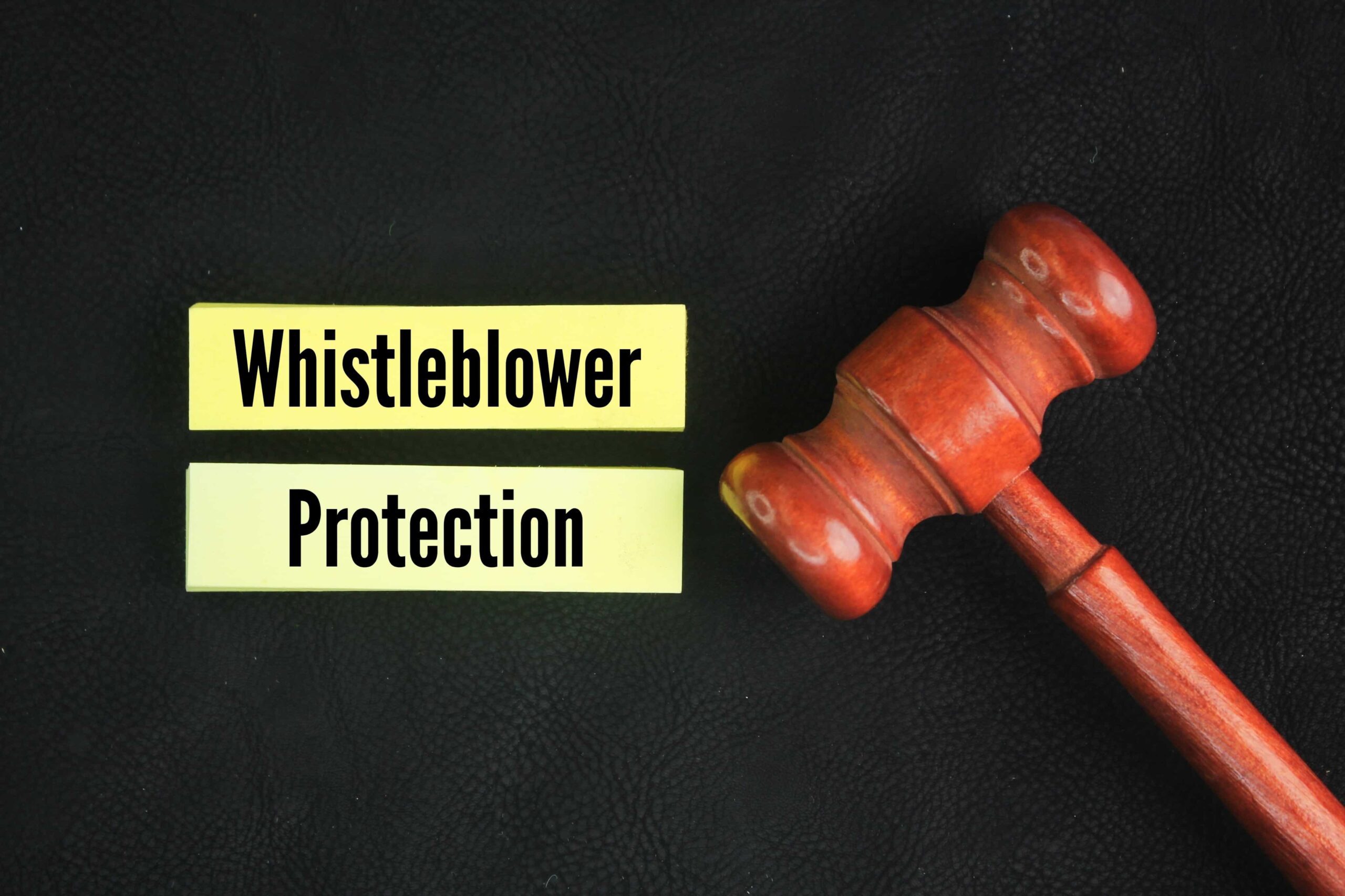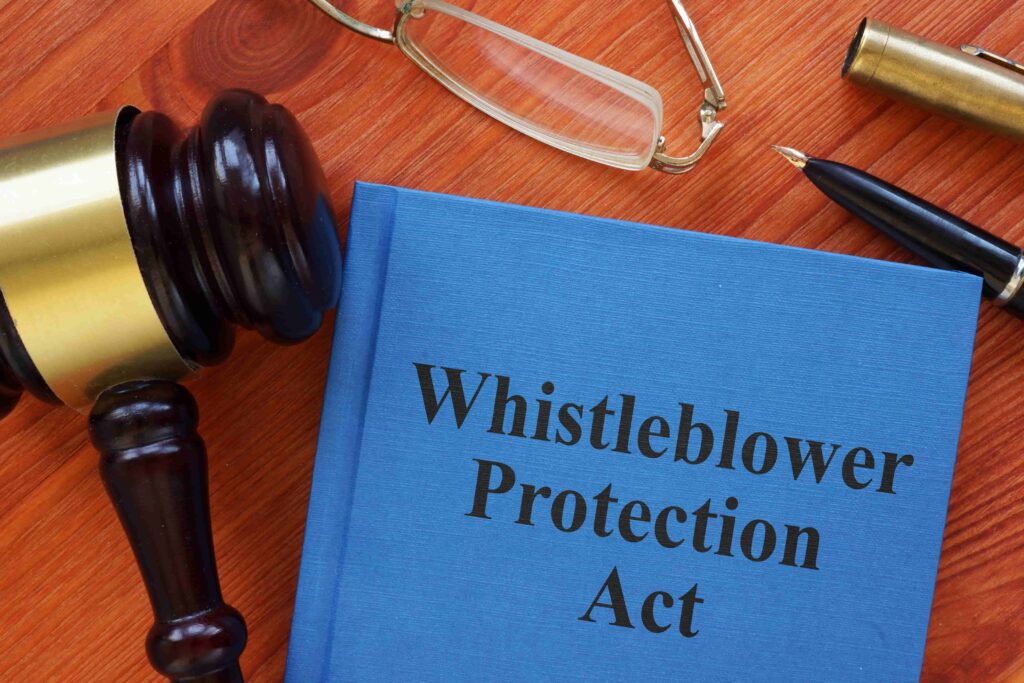
Florida employees who witness illegal activities or dangerous workplace violations now have stronger protections when reporting employer misconduct.
The enhanced Florida whistleblower protections that took effect July 1, 2025, provide private-sector workers across the state with expanded safeguards against retaliation and clearer pathways for reporting violations that threaten public safety or involve fraud against taxpayers.
Key Takeaways
- Florida’s enhanced whistleblower law now offers broader protections and faster resolutions for private-sector employees who report illegal activity.
- You must generally provide your employer with written notice and a reasonable chance to correct the violation before reporting it to a government agency.
- The law protects you when you report any violation of a federal, state, or local law, rule, or regulation, not just those creating imminent public danger.
- You must file a retaliation lawsuit within two years of discovering the retaliatory act or four years of the act itself, whichever date arrives first.
- If you win your case, you may recover your job, lost wages and benefits, attorney’s fees, and damages for emotional distress.
What Florida’s Private Whistleblower Act Covers
Florida’s private whistleblower law, found in Florida Statutes Section 448.102, shields employees from retaliation when they report illegal activities at work. The law applies to most businesses in the state, covering any private employer with ten or more employees. It protects you when you disclose, or threaten to disclose, a violation of law or when you refuse an employer’s request to participate in one.
The updates effective July 1, 2025, clarify and expand these protections. The law now explicitly states that reporting any violation of a federal, state, or local law, rule, or regulation constitutes a protected activity. This change removes ambiguity and gives employees greater confidence when speaking up about any form of workplace wrongdoing.
Protected Whistleblowing Activities in Florida

Your employer cannot punish you for reporting illegal activity to a government agency. Florida law protects three specific types of employee actions that expose workplace violations.
The Florida whistleblower protections cover three main categories of employee actions:
- Reporting Violations: You can report your employer’s illegal activities to government agencies, such as the Florida Department of Business and Professional Regulation, the Department of Environmental Protection, or federal oversight agencies.
- Helping Investigations: You’re protected when you provide information or testify in any investigation about your employer’s violations.
- Refusing Illegal Orders: Your employer cannot punish you for refusing to participate in illegal activities or practices.
Types of Violations Employees Can Report
Florida’s whistleblower protections cover a wide spectrum of illegal employer conduct. Common reports involve:
- Financial Fraud: This includes violations like Medicare or Medicaid fraud, tax evasion, securities violations, or overbilling on government contracts. Employees who report fraud against a government entity may find additional protections under the Florida False Claims Act, a separate but related law.
- Environmental and Public Safety Violations: You can report illegal dumping of hazardous materials, unsafe workplace conditions that violate OSHA standards, or failures to follow building codes that endanger the public.
- Workplace Discrimination and Harassment: If you report illegal discrimination based on race, gender, national origin, age, disability, or another protected characteristic, the law shields you from retaliation. These reports give you protection under both whistleblower laws and civil rights statutes.
Proper Procedures for Reporting Violations
To secure your legal rights under the statute, you must follow the correct reporting procedure. Florida law generally requires you to first notify your employer of the violation in writing. This gives the company a reasonable opportunity to correct the problem before you report it to an outside agency.
First, write a clear, factual description of the illegal activity you witnessed. Deliver this written notice to a supervisor or the appropriate person at your company. Always keep a dated copy for your records.
After providing notice, you must give your employer a reasonable time to address the issue. If your employer fails to take corrective action, you can then report the violation to the appropriate government agency. While the law requires written notice in most cases, the specific facts of your situation may alter your obligations.
Discussing your reporting strategy with an attorney helps you preserve your rights.
Real-World Examples of Whistleblower Situations

Understanding how whistleblower protections work in practice helps you recognize when the law applies. Here are hypothetical examples showing situations where Florida employees might need these protections:
- Healthcare Setting: A nurse notices her unit regularly violates patient safety protocols to save time. After reporting this to management in writing, she suddenly gets reassigned to night shifts and weekend rotations despite her seniority.
- Warehouse Safety: A forklift operator refuses his supervisor’s order to skip required safety checks to meet shipping deadlines. The next week, he receives his first written warning in five years for “insubordination” and “poor attitude.”
- Financial Fraud: An accountant discovers her company is hiding income from tax authorities. After alerting her boss, she finds herself excluded from finance meetings she previously led and removed from key projects without explanation.
These examples illustrate how retaliation often appears as sudden negative changes after employees report violations or refuse illegal orders.
Recognizing Workplace Retaliation
Retaliation happens when your employer punishes you for whistleblowing. It goes beyond just firing. Watch for these warning signs that you might be experiencing illegal retaliation:
- Getting demoted or transferred to a worse position
- Having your hours or pay cut
- Being denied promotions or raises without valid reason
- Receiving negative reviews without real cause
- Being excluded from meetings or training opportunities
Timing matters in retaliation cases. Courts often see the connection if bad things happen at work right after you report violations. However, retaliation can also happen months later, especially if employers try to build fake performance problems first.
Your Rights as a Whistleblower
Florida law gives you strong protections against retaliation. Your employer cannot fire, demote, suspend, threaten, or harass you for reporting illegal activities. These protections cover every part of your job—pay, benefits, assignments, and working conditions.
If your employer retaliates, you can take them to court. Winning your case can bring significant remedies. Courts can order your employer to give you back your job, pay lost wages and benefits, and cover your attorney’s fees. You may also receive compensation for emotional distress and damage to your career.
Time Limits for Filing Retaliation Claims

Don’t wait to act if you face retaliation. Florida law sets strict deadlines for filing claims. You have only 2 years from when you discover the retaliation, or 4 years from when it happened—whichever comes first.
These short deadlines make immediate action crucial. Write down every detail about retaliatory actions as they happen. Note dates, times, and witnesses. Start looking for an employment attorney right away to protect your rights.
Potential Remedies and Compensation
Winning a retaliation case can bring substantial relief. Courts aim to make you whole again after illegal retaliation. Economic remedies replace what you lost financially:
- All wages lost since the retaliation
- Future pay if you can’t return to work
- Lost health insurance and retirement benefits
- Missed bonuses or commissions
Beyond money, courts address personal harm too. You may receive compensation for emotional distress, anxiety, and damage to your reputation. Many employees get their jobs back or comparable positions. Courts can also order employers to remove negative information from your personnel file.
Common Employer Defenses
Employers often claim they had good reasons for punishing you that had nothing to do with your whistleblowing. They might point to poor performance, attendance problems, or company-wide layoffs. Understanding how courts evaluate these defenses helps you prepare a stronger case.
Courts look closely at timing when employers claim legitimate reasons. Did your performance suddenly become “poor” right after you reported violations? Were you included in layoffs while less qualified employees kept their jobs? Judges examine whether the employer’s stated reasons match their actions.
Documentation becomes crucial in defeating employer defenses. Courts want to see your positive performance reviews before whistleblowing. They look for evidence that other employees with similar issues weren’t punished. Written warnings that appear only after you report violations often reveal retaliation. The more substantial your evidence of good work history, the harder it becomes for employers to claim legitimate reasons for punishing you.
Building a Strong Whistleblower Retaliation Case
Success requires careful documentation from the start. Save every piece of evidence about both the violations you reported and any retaliation. This includes:
- Your written notice to the employer about violations
- All emails or messages about the issue
- Notes from conversations with dates and details
- Any response (or lack of response) from management
Creating a detailed timeline is crucial for showing retaliation patterns. Organize your evidence systematically—use dated folders or binders to track the sequence of events. This timeline helps demonstrate how your treatment changed after whistleblowing.
Keep physical and digital copies of important documents in secure locations outside work. During litigation, attorneys can later subpoena internal company records like emails, HR files, and management communications. The more organized your initial evidence, the stronger your whistleblower attorney can build your case.
Find witnesses who saw the violations or the retaliation against you. Their testimony can make your case much stronger. Even if coworkers hesitate to get involved, their accounts support your claims.
The Role of Government Agencies

Multiple government agencies investigate whistleblower reports and retaliation claims. The U.S. Department of Labor runs whistleblower programs through five different agencies that enforce anti-retaliation laws.
Federal agencies like OSHA, the SEC, and others have their own whistleblower programs. These agencies investigate violations, punish employers, and sometimes offer ways to resolve disputes without going to court. Working with the right agency while pursuing your individual claim strengthens your position.
Recent Updates to Florida Whistleblower Protections
The July 1, 2025 improvements to Florida’s whistleblower law fix several problems that left employees vulnerable. Major changes include broader coverage of violations you can report, easier procedures for certain types of reports, stronger protections when you help government investigations, and clearer rules about opposing illegal practices.
The updates also require employers to handle internal reports better. They must now create written procedures for receiving complaints, acknowledge your report in writing, and document their investigation and any fixes they make. This new employer accountability creates a paper trail that strengthens employee cases. Companies must maintain complaint logs and provide written responses—evidence that can prove valuable if disputes arise later.
FAQ for Florida Whistleblower Protections
What’s the difference between Florida’s public and private sector whistleblower laws?
Florida has two separate whistleblower laws. Government employees get protection under Florida Statutes Section 112.3187. Private sector workers use Section 448.102. Public employees often get broader protections and can file complaints with the Florida Commission on Human Relations within 60 days of retaliation.
Can I report violations anonymously and still receive whistleblower protection?
Florida law usually requires you to identify yourself to get retaliation protection. The law protects reports made “under oath, in writing,” which means giving your name. You might make anonymous tips to start investigations, but you’ll need to identify yourself later if you face retaliation and want legal protection.
What if my employer is smaller than 10 employees?
Florida’s Private Whistleblower Act only covers companies with 10 or more employees. Smaller employers aren’t covered by this law. However, you might still have protection under federal whistleblower laws or other employment laws, depending on what violations you’re reporting.
Do I need proof that the violation actually occurred to receive protection?
You don’t need absolute proof. You just need a reasonable, good-faith belief that your employer broke the law. Courts ask whether a reasonable person in your situation would think the activity was illegal. But be careful—knowingly making false reports removes your protections and could get you in legal trouble.
Can I be forced to sign away my whistleblower rights?
No, employers cannot make you give up your whistleblower rights as a job requirement. Basic whistleblower protections under Florida and federal law cannot be waived. Any contract trying to stop you from reporting illegal activities to the government won’t hold up in court.
What happens if my employer investigates my report but concludes there was no wrongdoing?
Even if your employer’s internal investigation finds no violation, you still have protection from retaliation. The law protects you for reporting a violation based on a reasonable, good-faith belief that it occurred.
Your protection does not depend on your employer agreeing with you or on you proving the underlying violation. As long as your report was not knowingly false, your employer cannot punish you for making it.
What is the difference between filing a complaint with a government agency and filing a lawsuit?
Filing a complaint with an agency like the Occupational Safety and Health Administration (OSHA) or the Securities and Exchange Commission (SEC) prompts that agency to investigate your employer for the underlying violation you reported. The agency enforces the law to stop the illegal practice.
Filing a lawsuit for retaliation is a separate, private action you take against your employer in court. The lawsuit seeks personal remedies for the harm the retaliation caused you, such as recovering lost wages, getting your job back, and receiving compensation for emotional distress. You can often pursue both paths simultaneously.
How do I choose the right lawyer for my whistleblower case?
Look for an attorney or law firm that focuses on employment law, specifically representing employees. Ask about their experience with Florida’s Private Whistleblower Act and federal whistleblower laws. In your consultation, ask about their strategy, communication practices, and fee structure.
Choose a lawyer who listens to your story, explains your rights clearly, and gives you confidence in their ability to fight for you.
Getting Legal Help for Whistleblower Retaliation
Blowing the whistle takes courage, but Florida law now provides stronger safeguards so you don’t have to choose between your job and your integrity. If you’re facing retaliation or considering reporting workplace misconduct, Brenton Legal stands ready to protect your rights, your livelihood, and your future.
Don’t face retaliation alone—Brenton Legal helps Florida employees fight back against employers who break the law. Our employment attorneys understand the fear and uncertainty you’re experiencing. We’ll guide you through every step while fighting for the compensation and justice you deserve.
Contact Brenton Legal at (954) 639-4644 for a confidential consultation about your whistleblower rights and potential retaliation claims.

